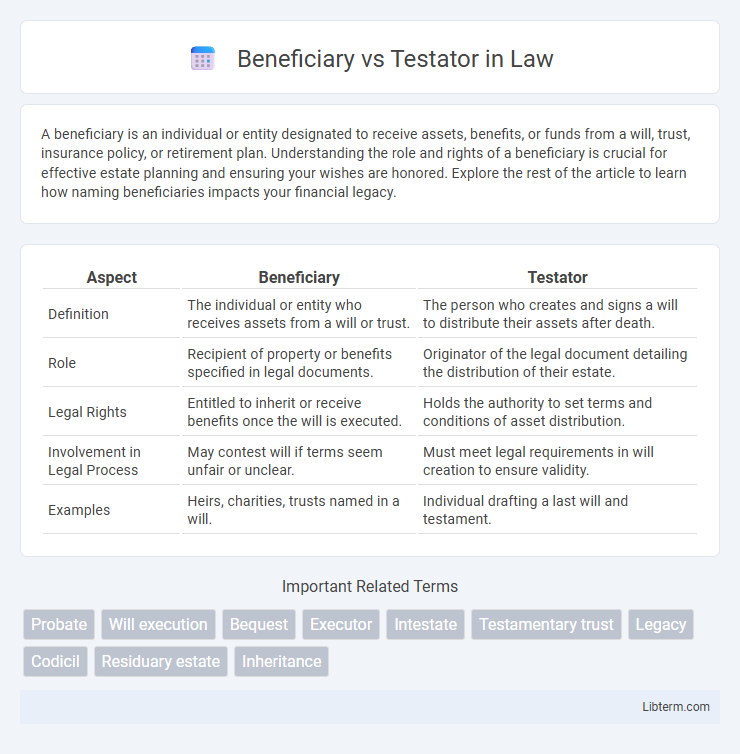A beneficiary is an individual or entity designated to receive assets, benefits, or funds from a will, trust, insurance policy, or retirement plan. Understanding the role and rights of a beneficiary is crucial for effective estate planning and ensuring your wishes are honored. Explore the rest of the article to learn how naming beneficiaries impacts your financial legacy.
Table of Comparison
| Aspect | Beneficiary | Testator |
|---|---|---|
| Definition | The individual or entity who receives assets from a will or trust. | The person who creates and signs a will to distribute their assets after death. |
| Role | Recipient of property or benefits specified in legal documents. | Originator of the legal document detailing the distribution of their estate. |
| Legal Rights | Entitled to inherit or receive benefits once the will is executed. | Holds the authority to set terms and conditions of asset distribution. |
| Involvement in Legal Process | May contest will if terms seem unfair or unclear. | Must meet legal requirements in will creation to ensure validity. |
| Examples | Heirs, charities, trusts named in a will. | Individual drafting a last will and testament. |
Definition of Beneficiary
A beneficiary is an individual or entity designated to receive assets, benefits, or proceeds from a will, trust, insurance policy, or other legal arrangement. The testator is the person who creates the will or legal document specifying how their estate should be distributed. Understanding the definition of beneficiary is crucial for estate planning and the execution of testamentary wishes.
Definition of Testator
The testator is an individual who creates a will to specify how their assets and estate should be distributed after death. This legal document appoints beneficiaries, who are recipients of the estate or specific bequests outlined by the testator. Understanding the testator's intent is essential for the valid execution of the will and the proper transfer of property rights.
Key Differences Between Beneficiary and Testator
The testator is the individual who creates a will outlining how their estate will be distributed after death, while the beneficiary is the person or entity designated to receive assets or benefits from that will. A testator holds the decision-making authority to allocate and specify inheritances, whereas a beneficiary has no control over the terms and only gains rights once the testator passes away. Understanding these roles clarifies estate planning, ensuring clear delineation between those who set testamentary intentions and those who receive the resulting benefits.
Roles and Responsibilities
A testator is the individual who creates and legally executes a will, defining the distribution of their estate after death. Beneficiaries are the persons or entities designated in the will to receive assets, property, or benefits from the testator's estate. While the testator holds the responsibility for specifying terms and conditions of the will, beneficiaries hold rights to claim their inheritances as outlined in the document.
Legal Rights of a Beneficiary
A beneficiary holds legal rights to receive assets or benefits designated in a will or trust, enforceable upon the testator's death or during their lifetime in certain trusts. The testator, who creates the will or trust, defines the distribution of their estate and can modify or revoke it as long as they are legally competent. Beneficiaries have the right to challenge invalid wills, demand proper administration of the estate, and receive a clear accounting of assets managed by the executor or trustee.
Legal Duties of a Testator
The testator holds the legal responsibility to create a valid will that clearly outlines the distribution of assets to designated beneficiaries. Legal duties of a testator include ensuring the will is executed voluntarily, with legal capacity, and complies with state-specific testamentary laws to prevent disputes. Failure to fulfill these duties can result in the will being contested or deemed invalid by probate courts.
Importance in Estate Planning
Understanding the roles of beneficiary and testator is crucial in estate planning to ensure clear asset distribution and avoid legal disputes. The testator creates the will, dictating how the estate is managed and allocated, while beneficiaries are the individuals or entities designated to receive those assets. Properly identifying beneficiaries and specifying their shares protects the testator's intentions and provides financial security for heirs.
Common Misunderstandings
Common misunderstandings between a beneficiary and a testator often arise from confusing their roles in estate planning; the testator is the individual who creates the will, while the beneficiary is the person or entity designated to receive assets. Many mistakenly assume beneficiaries have authority to modify the will, but that power resides solely with the testator during their lifetime. Legal clarity on these distinctions is crucial to avoid disputes and ensure the testator's intentions are honored after death.
Impact on Inheritance Process
The testator, who creates the will, determines the distribution of assets and the designation of beneficiaries, directly impacting the inheritance process by defining legal ownership transfer. Beneficiaries, as recipients named by the testator, have rights to claim and receive the specified inheritance according to the will or trust directives. Disputes often arise when beneficiary designations are unclear or contested, potentially delaying probate and affecting the efficiency of estate settlement.
Beneficiary and Testator in Legal Documents
A beneficiary is the individual or entity designated in legal documents such as wills, trusts, or insurance policies to receive assets or benefits upon the testator's death or under specific conditions. The testator is the person who creates a will or legal instrument, expressing their wishes regarding the distribution of their estate or property. Understanding the distinct roles of beneficiary and testator is essential for interpreting legal documents, estate planning, and executing testamentary instructions accurately.
Beneficiary Infographic

 libterm.com
libterm.com